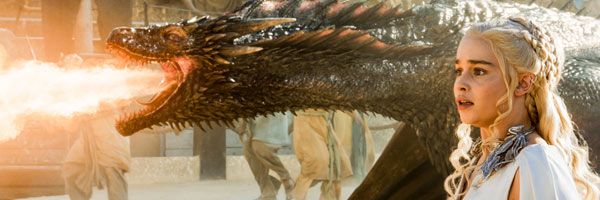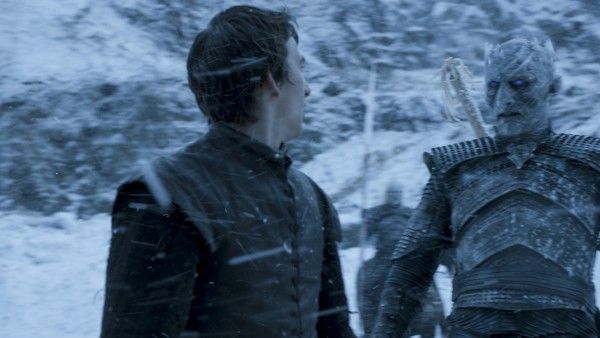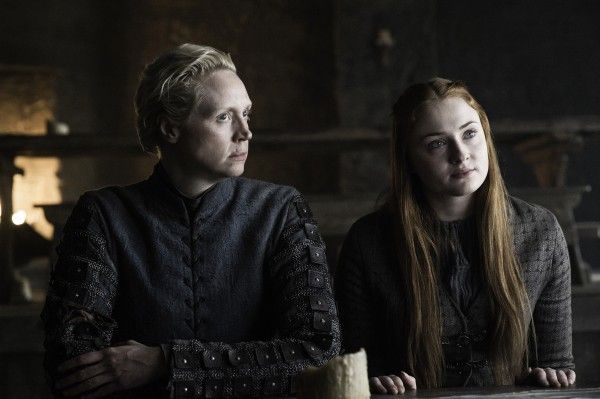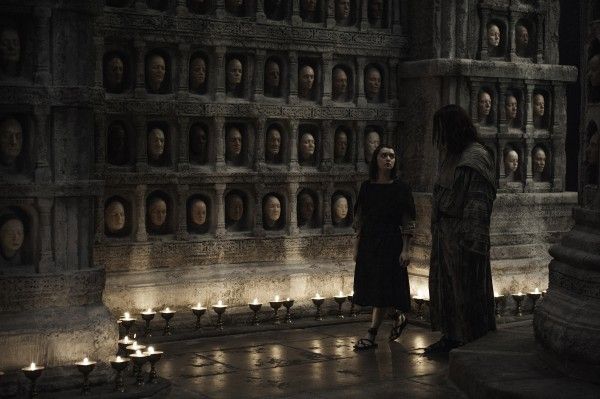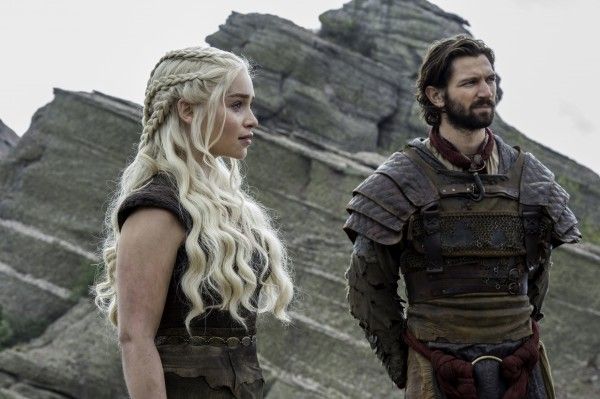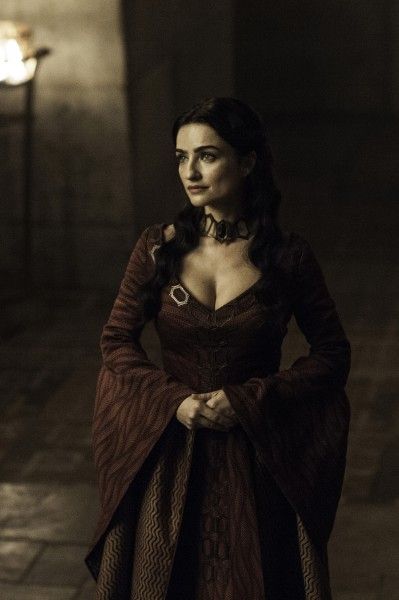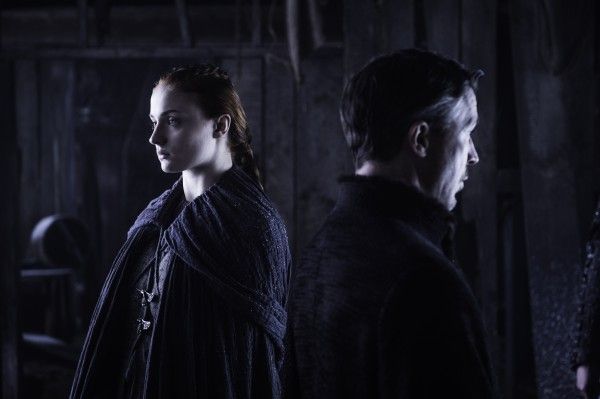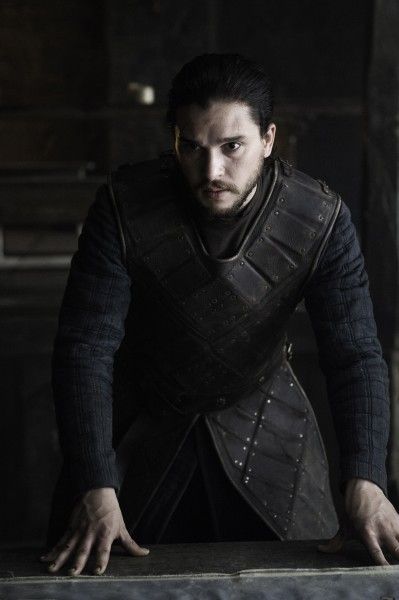For the first time, Game of Thrones Season 6 gave us some whole truths concerning the origins of many A Song of Fire and Ice subjects. Forget the Tower of Joy; the Weirwood Tree is where it’s at. Readers of the books have been waiting for the origin story of the White Walkers and Hodor for a long time, and “The Door” gave it to us all. The heartbreaking, yet satisfying information drop made for the best episode of the season so far. (The zombies helped, too.)
[Editor's note: You can also get a snapshot of recent events and find out where everyone is in the Known World by using our handy map!]
Weirwood Tree
We finally learned the heartbreaking origin story of Hodor, and it is even more tragic than the most tragic of people’s speculative theories. Anyone who had money on: warged through time to save Bran and Meera’s lives from ice zombies gets $10. It’s no secret that Game of Thrones likes to kill its characters, but, in later seasons, more of those deaths feel more superfluously brutal than organically tragic. Hodor’s death — sacrificing his life for Bran, someone he loved —definitely falls into the latter category.
It says a lot about Hodor’s character that we 100 percent believe he would make this choice. After all, he has been choosing Bran since they first escaped from Winterfell — and he chose allegiance to the Starks long before that. Though we’re not sure how much Hodor understood, it’s not completely out of the question to assume that he perhaps understood that the seizure that changed his life was caused by Bran. If that is the case, then it makes every time he chose to carry Bran across the frozen tundra of the north beyond the wall that much more impressive.
Hodor’s death also poses some interesting questions about the limits and possibilities of the world within the weirwood. We’ve always known that, as a student of the Three-Eyed Raven (and, now, the Three-Eyed Raven himself), Bran’s is capable of seeing across time and space. However, the rules for how much change he can affect have been much more mysterious. A young Ned Stark maybe heard his future son’s voice as he was entering the Tower of Joy. Now, we know that the boundaries across time are seemingly much more fluid than we first imagined.
There’s the Hodor example, which saw Hodor’s consciousness being transmitted across time — something seemingly made possible when Young Hodor noticed Bran standing in the Winterfell yard — and the example of the White Walker grasping Bran’s arm. The latter example resulted in the White Walkers breaking the wards on the Three-Eyed Raven’s cave and coming after Bran & co. It seems important to ask the question: Will Bran’s brand serve as a White Walker ward-breaker for other possible magical barriers — i.e. The Wall? Basically: Don’t screw this up, Bran.
As part of this week’s Three-Eyed Raven arc, we also got the origin story of the White Walkers themselves, who were created by the Children of the Forest as a method of defense against men. The Children of the Forest created the White Walkers (by burying a dragonglass dagger inside of their chests) because of deforestation. They were tired of men chopping down trees. Moral of the story: Save the rainforest! Also, climate change will probably kill us all.
In the end, Meera and Bran were seemingly the only two to make it out of the weirwood cave alive. (R.I.P., Summer.) They are on their way back to the Wall, with a whole ice zombie army probably on their tales. Hopefully, Hodor’s sacrifice (not just his life, but his way of life before that) will be worth it.
Castle Black
Sansa continues her streak of badassery this week, not only telling Littlefinger to go stuff it for handing her over to the monster known as Ramsay Bolton. Petyr claims he didn’t know of Ramsay’s cruelty, to which Sansa awesomely responds: “If you didn’t know, you’re an idiot. If you did know, then you’re my enemy.” This woman does not mince words. She has had it up to here with men betraying her and trying to make her feel small.
Sansa’s dominance is echoed in her handling of Team Stark’s strategy session, which was wonderfully reminiscent of Game of Thrones Seasons 1 and 2 when the War of the Five Kings was all about moving players (i.e. houses) around the board. She voices her opinion on who will stay loyal to her family, and pushes the group in the direction of commandeering her uncle Brynden “Blackfish” Tully’s army to help with the attack on Winterfell.
She doesn’t however, tell Jon that she knows about Brynden’s army from her meeting with Littlefinger. This is both disheartening in relation to the Jon/Sansa relationship (she made him a fur cloak like their father’s!) and potentially worrying in relation to Littlefinger. Could she be playing into Petyr’s hand? His manipulations are often much more subtle than this. Even though I was sad to see Sansa lying to Jon (though, interestingly enough, demonstrating complete confidence in Brienne, someone she knows far less well), I am also happy to see Sansa stepping up to become a major player in the game of thrones. Hopefully, she has better luck than the rest of her family has thus far.
Braavos
Speaking of Starks with bad luck, we spent more time watching Arya get beat up by The Waif at the House of Black and White. A Girl has gotten better at hiding her desires, but it’s hard to imagine that someone who watches the story of Ned Stark’s death with such expression has truly let go of her past or previous identity. She laughs with cathartic joy when Joffrey is punished, but her mood soon turns starkly sober when she sees how the actors have chosen to portray Ned: as a bumbling, vulgar idiot. When the “character” has his head chopped off, Arya’s expression is one of quiet fury, as she stood essentially in the same place when she witnessed it all actually happen.
It’s notable that Arya doesn’t get a character in the play. To the people of Braavos, she is not a key player. She has already been forgotten by history. Her decision to at least temporarily give up her identity is echoed in the play. It’s not hard to imagine that Jaqen sent her to this particular play not only to scope out her future assassination of Lady Stork, but to test her loyalty to this face-less existence she claims to want. Judging by her in-the-moment reaction to the play and her questions about the reasons behind Lady Stork’s hit, it seems a safe bet that Arya won’t stay A Girl forever… No, Arya Stark won’t let history forget her.
Vaes Dothrak
Daenerys is taking a well-earned break after burning down an entire temple, but, even in a slow week, she has some decisions to make: mainly, what to do with Jorah who she has tried to banish not once, but twice. The dude just keeps coming back. She seems poised to throw him out once again before Jorah plays his trump card: he’s dying from greyscale. Faced with the prospect of Jorah’s death, Daenerys orders him to go in search of a cure. She refuses to conquer the Seven Kingdoms without him. Hopefully, Jorah’s search means he will be intersecting with some other storylines (because no one wants to watch Jorah wander around by himself). My money is on Jorah ending up in Braavos where he will somehow intersect with Arya.
Iron Islands
While Daenerys is busy organizing her new Dothraki army, Euron Greyjoy is busy planning their future marriage. The brother-killer crashes the Kingsmoot just as Theon has thrown his support behind Yara. Though it probably makes more sense for the leaders of the Iron Islands to bet on the horse they know, Euron’s confidence (and probably dudeliness) make him the winner. Yara and Theon aren’t going out with a fight, however. They steal the Iron Islands’ best ships and take off with the rather sizable chunk of the population that is loyal to them.
Meanwhile, Euron somehow inspires loyalty by asking those who stayed behind to help him build a fleet of a thousand ships so that he can sail across the Narrow Sea, offer Dany his hand (and fleet) in marriage, and prove wrong anyone who ever thought the men of the Iron Islands couldn’t conquer Westeros.
It’s a long-term plan with a lot of ifs. These people are making a lot of assumption about Daenerys — and about the current political system staying the way it is for as long as it takes to build 1,000 ships. (How long does it take to build 1,000 ships?) I’m not sure if I believe the people of the Iron Islands would follow Euron, but I am excited to see what Yara and Theon are capable of now that they have joined forces and that Theon seems to be getting some of his confidence back.
Meereen
With Daenerys still absent from Meereen, Tyrion and Varys go big with their efforts to win the people of the city over to their queen’s cause. They bring in the big guns: a priestess of the Lord of Light. Kinvara is the second “Red Woman” we have seen, and she is just as charismatic as Melisandre. Tyrion and Varys know that it isn’t enough to establish a fragile peace in Meereen; they also need to make sure the people know that Dany is responsible for it. Basically, they need to up their propaganda game. The dream team sets about convincing Kinvara, which is an easy sell. She already believes Dany to be the Prince(ss) Who Was Promised. She will spread the word to her followers.
Varys isn’t so sure. Stannis once trusted a Red Woman to lead him to victory, and she abandoned him to die. Why should Daenerys trust Kinvara? It’s a fair question, but Kinvara convinces Varys that she is the real deal by giving him, a totally interested Tyrion, and us clues about Varys’ own origin story. The same night that saw him made a eunuch by a sorceror also potentially turned him into a believer. Kinvara speaks of Varys hearing a voice in the fire and, based on Varys’ reaction, he remembers it, too. But how much does Varys know and care about the Lord of Light? He’s never seemed like a particularly religious fellow, but it could be a force guiding his hand. Has he been looking past the game of thrones to the great war to come this whole time? Or is he just a man who once heard a voice in the fire on the worst night of his life?
Rating: ★★★★ Very good
Miscellaneous:
“You freed me from the monsters who murdered my family and gave me to other monsters who murdered my family.” — Sansa
Was Littlefinger’s “half-brother” dig at Jon an effort to get Sansa to doubt him? It seems like it should take more than this to shake their allegiance to one another, something Sansa’s confirmation that Jon is as much a Stark as she is reinforced, though Sansa’s lie threw further into question.
“Does death only come for the wicked and leave the decent behind?” — Jaqen, voicing what should be the tagline for this show.
The Iron Islands has got to have the worst coronation procedure in all of the Seven Kingdoms. And then you get a piece of driftwood as a crown. Not worth it.
“Let’s go murder them.” — Euron Greyjoy, on his beloved niece and nephew. You have to admire his honesty about killing/wanting to kill family members.
“He seems trustworthy. A bit brooding perhaps.” — Brienne, on Jon Snow.
“Jon is Jon.” — Sansa, on Jon Snow.
Brienne and Turmond shared another romantically comedic moment in this episode. How has this duo, without even sharing any actual conversation, developed more of a compelling relationship than some TV shows manage with their central couple over the course of an entire season?
“Hold the door.”

